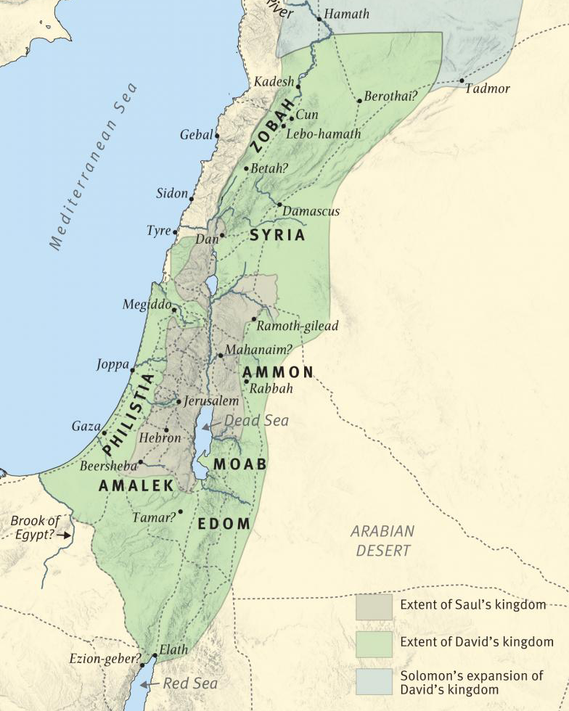Looking for a King
On the journey from Egypt to the Promised Land Moses had some help. His sister, Miriam, his brother, Aaron, and Joshua all played prominent parts in that forty year trek. But, as the people were on the verge of entering that Promised Land, Moses died. Joshua was enough of a respected figure to retain leadership.
Still, there was no government and no elected authority. The laws were the commandments received at Sinai and the extrapolations that had developed during the journey.
Map from ESV Study Bible p. 2752
Reflection - One King
By Steve Hall
https://bible.usccb.org/bible/readings/121821.cfm
Jeremiah 23:5-8
Matthew 1:18-25
When I was a kid and one wanted to be verbally impressive the word to be said and spelled — correctly of course — was :’Eleemosynary.’ In case you’re deprived of trivial information, the word means ‘dependent on charitable institutions.’ The word didn’t hold its place for long, however, because Disney released Mary Poppins and an even more obtuse word took its place. Some of you may remember as the film has been reshown many times since. The word was ‘supercalifragilisticexpialidocious.’
Today I’m going to offer another of those strange words that are seldom heard, often mis-pronounced, and frequently incorrectly spelled. This new word is ‘amphictyony.’ That’s right! I said ‘amphictyony.’ Strangely enough, the word has great importance when seeking to appreciate today’s Old Testament text. The word is intended to summarize in a single word an informal association of neighboring states whose purpose is to protect the common interest.
Those who left Egypt under Moses’ guidance were the descendants of Jacob. As you may recall, Jacob had twelve sons; and so those following Moses were comprised of the twelve tribes, the descendants of Jacob, and they were identified by their lineage as coming from those twelve sons. As promised by God to Abraham, Isaac and Jacob, these were the Chosen People. On the journey from Egypt to the Promised Land Moses had some help. His sister, Miriam, his brother, Aaron, and Joshua all played prominent parts in that forty year trek. But, as the people were on the verge of entering that Promised Land, Moses died. Joshua was enough of a respected figure to retain leadership.
Still, there was no government and no elected authority. The laws were the commandments received at Sinai and the extrapolations that had developed during the journey. As a single people they crossed the Jordan and besieged the town of Jericho. We’re all familiar with the story of Jericho’s walls that came tumbling down. Subsequently, the twelve tribes moved into the interior of the Promised Land; and initially they worked with one another to accomplish — more or less — the task God had given them. If you look at a map of Israel that intends to show the division of the land immediately following the conquest, you will see it is parceled out among the tribes — each receiving his own section.
The Scriptures tell us that Joshua maintained control for a period of time. But the tribes were anxious to settle down and they did so without completing God’s command to drive out the pagans who lived there. The consequence of this failure was trouble. That trouble was not just the result of pagan idols, pagan shrines and pagan worship; it was also the result of attacks from those who previously occupied the place as well as attacks from neighboring tribes.
This is where the concept of an ‘association of neighboring states whose purpose is to protect the common interest,’ an amphictyony, was supposed to come into play. The twelve tribes, the descendants of the twelve sons of Jacob, were supposed to work together for the protection of one another. So much for theory.
The lack of cooperation was temporarily resolved by God, who raised up ‘judges’ to accomplish God’s purpose. You can read about the judges in the Bible, they have their own Book. Their period lasted about one hundred years.
Eventually the people decided that they needed a king like other nations had. They thought that would solve their problems. They were warned that was not a wise choice for two reasons: first, God was supposed to be their only king, and second, kings would inevitably pursue their own agenda. Nevertheless, God agreed to their request and had the Prophet Samuel appoint Saul as king. Initially this was productive. Saul was caught up in resolving the many conflicts between Israel and its neighbors. As the years passed, his mental condition declined and eventually Samuel was directed by God to appoint David as King. The Scripture tells us that God had made his choice of David to be King even before it was made known to the people at large.
“The LORD has sought out a man after his own heart; and the LORD has appointed him to be prince over his people, because you [Saul] have not kept what the LORD commanded you."
(1 Samuel 13:14)
For a variety of reasons David’s kingdom was the greatest in Israel’s history. He completed the defeat of Israel’s enemies. He united the twelve tribes into a single nation. But most important, he destroyed pagan worship, upheld the Law and reinstated the proper forms of worship. Indeed, he was a man after God’s own heart. The subsequent history of Israel would reveal none that could measure up to him. Solomon may be remembered for his power and wealth; but in his later years he also reestablished shrines for pagan worship.
Unfortunately the struggle between paganism and the true worship as described in the Torah would continue throughout most of Israel’s pre-Christian history. The role of the kings in this cannot be over emphasized. The king was the embodiment of the people. We recognize this historically during the age of European evangelization. The faith of the king quickly became the faith of the people so if the king or leader of a people was converted to Christianity, most of the people were soon baptized. In this regard it is well to remember the warnings given by the prophet before God agreed for the people to have a king: first, God was supposed to be their only king, and second, kings would inevitably pursue their own agenda. It was Solomon’s agenda to pursue wealth and power; it was his arrogance that led him to re-establish the worship of foreign ‘gods’.
All of which brings us to the promises in the reading from Jeremiah as well as to the hopes expressed in the Psalm. At the time when Jeremiah made his prophetic claim the nation had suffered under one king after another; his vision is of a better time.
“Behold, the days are coming, says the LORD,
when I will raise up a righteous shoot to David;
As king he shall reign and govern wisely,
he shall do what is just and right in the land.”
The Psalm literally aches for that day.
“Justice shall flourish in his time, and fullness of peace for ever.
He shall govern your people with justice
and your afflicted ones with judgment.
He shall rescue the poor when he cries out,
and the afflicted when he has no one to help him.
He shall have pity for the lowly and the poor;
the lives of the poor he shall save.”
Psalm 72:1-2, 12-13, 18-19
Neither the kings of Israel nor the kings of Judah were the saviors the people longed for. From time to time a better one might come on the scene; but the words of Samuel from years before would prove true: Human kings would prove to have the frailties of all mankind. Only God could be the king the people desired. That is why the words of the Angel bring such consolation: ‘They shall name him Emmanuel, which means “God is with us.”’
Years, centuries, even millennia have gone by and mankind still looks to human kings as if they were both the cause and the solution to life’s problems. We have yet to learn that the ancient words of Samuel have proved true. We are the idiots who frustratingly persist in the same patterns yet expect different results. When will we change our cry: We have no king but . . . . ?

